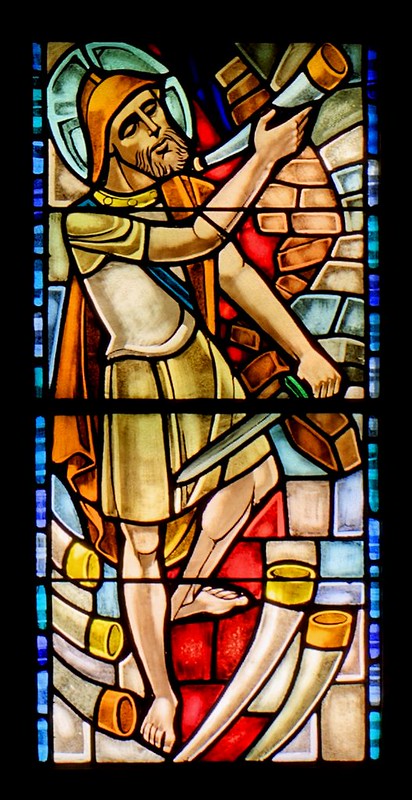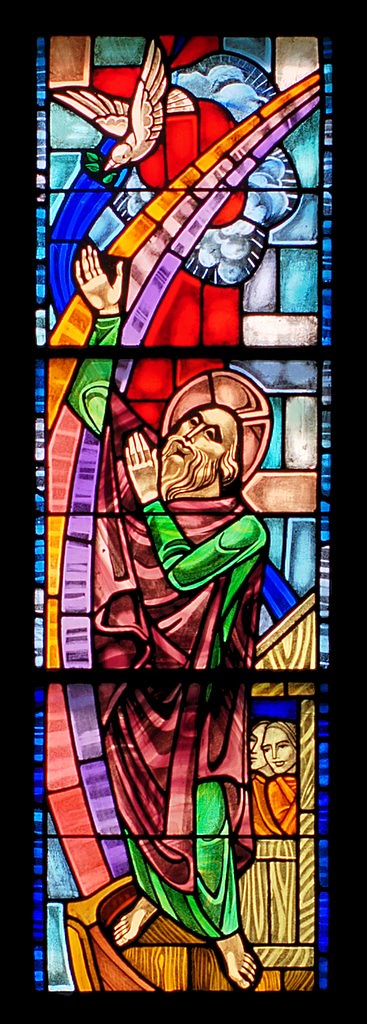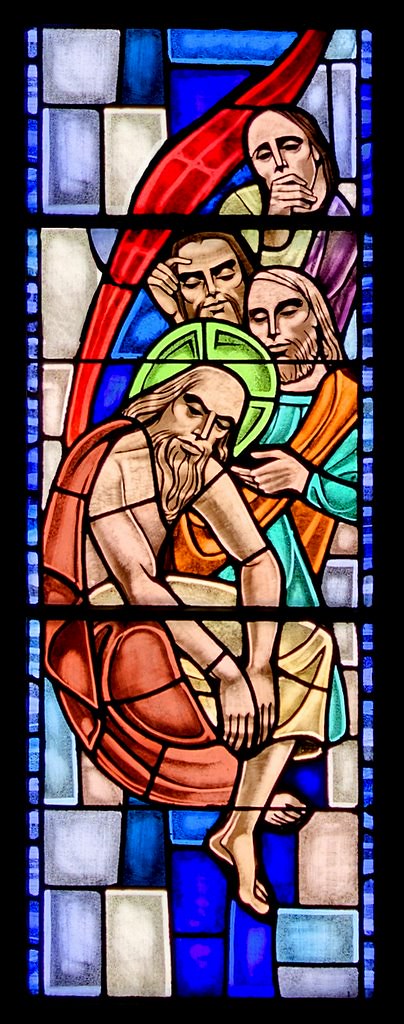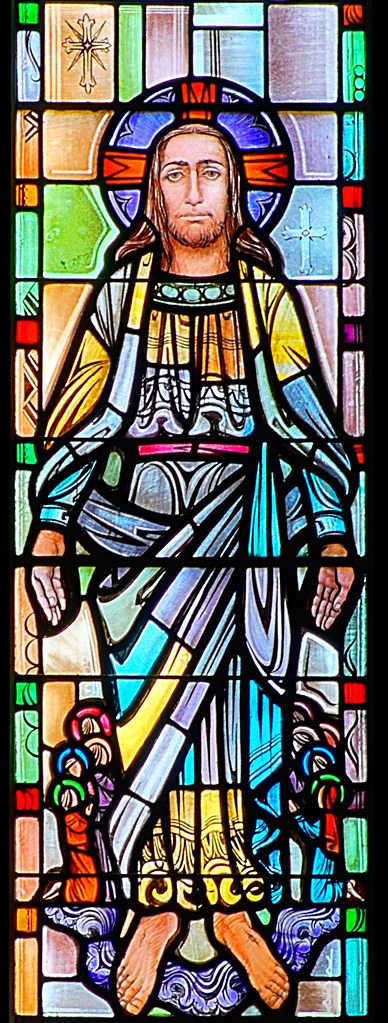by Pastor Paul Wolff
 |
| David playing the harp |
The beginning of the story is found in Deuteronomy 7:1-6 in the days of Moses. God tells Moses and the Israelites that when He brings them into the land He had promised to Abraham and his descendants, they are to completely destroy all the peoples living there, including the Amorites and others. The Israelites were not to intermarry with them, nor make any treaty or covenant with them, but they must devote them to complete destruction. The peoples of Canaan were idolaters, and the Israelites were to completely destroy their altars and places of worship lest they fall into idolatry and come under God’s curse themselves (which they did from time to time.) God was very clear in His instructions about how they ought to deal with the people of Canaan.
 |
| Joshua made a treaty in God's name with the Gibeonites |
Three days later, Joshua heard that the Gibeonites were their neighbors. The Israelites did not attack them, because of the oath that they made not to harm them, but they summoned their leaders and said, “Why did you deceive us?” The Gibeonites were very gracious, and humbled themselves before Joshua and the Israelites. They told of how they had heard how God had commanded Moses to destroy all the inhabitants in the land, and they feared for their lives. They said, “We are your servants, do whatever seems good and right.” Joshua cursed the Gibeonites to be the servants of the Israelites, being woodcutters and water bearers, but he honored the treaty he made with them and let them live. For their part, it seems that the Gibeonites were just glad to escape God’s judgment on the Canaanites, and they lived at peace with the Israelites and did not betray their part of the treaty.
The Israelites also kept their part of the treaty until King Saul tried to destroy the Gibeonites. Another strange part of this story is that Saul’s part in this story is not found elsewhere in Scripture. Apparently the chronicler who wrote the Book of Samuel did not think this particular misdeed of Saul’s was an important part of the story in a chronological telling, and he did not mention it until he wrote of God bringing the famine in 2 Samuel 21. David, however, knew the history (or looked it up in Scripture), and called the surviving Gibeonite leaders and said, “What shall I do for you to make atonement that you may bless the Lord’s inheritance?”
 |
| The rainbow is God's sign to Noah that He would not destroy the earth again with a flood even though the thoughts of man are only evil all the time. Genesis 6:5 and 8:21 |
All of this begs the question: Why would God go to such great lengths to punish Israel for Saul’s misdeeds, many years after Saul had died, on behalf of a people whom He had condemned for destruction hundreds of years earlier, for the sake of a treaty Joshua had made against God’s command? The answer is that God keeps His promises. Or, in this case, God honors the promises made by His people in His name and on His behalf. Despite the fact that God had intended for the Gibeonites to be destroyed with all the inhabitants of Canaan, Joshua had sworn an oath in God’s name that the Gibeonites would not be harmed by the Israelites, and when Saul broke that treaty, God allowed the Gibeonites restitution for the sake of justice, and the honor of God’s name.
If God would go to these great lengths to keep this promise made in His name, even though He never wanted it in the first place, then what does this say about how God will regard His other promises? It shows that God can absolutely be trusted to keep all His promises, no matter what happens.
 |
| The very day that Adam and Eve sinned God promised to send a savior who would rescue them from their sin. |
Compared with the Incarnation of God in Jesus, and the redemption He won for our forgiveness and salvation, the incident with the Gibeonites is of little consequence, but it shows that God honors His promises, and He can be trusted to remain faithful in big promises, and small.
We all ought to see ourselves in a similar situation as the Gibeonites. As the Gibeonites were condemned to destruction for their idolatry, so we are condemned to destruction for our idolatry and other sins. As Joshua promised to spare the Gibeonites, so the greater Joshua (the name “Jesus” is the Greek version of the name, Joshua, meaning, “savior”) has promised to spare us from the punishment due us on account of our sin, because He paid the price and satisfied God’s wrath by dying in our place.
 |
| Job’s friends were no comfort
when they misrepresented God’s promises. Worldly wealth is not a sign of God’s favor, and poverty is not a sign of God’s disfavor. |
Here is a sampling of a few of God’s promises which we can rely upon:
Hebrews 13:5-6 says, “Keep your life free from love of money, and be content with what you have, for (God) has said, ‘I will never leave you nor forsake you.’ So we can confidently say, ‘The Lord is my helper; I will not fear; what can man do to me?’” God will never leave us, though, in His mercy, He remains hidden from our senses. This is a matter of faith, but since we can trust in God’s promises we can trust that it is true even (and especially) when it seems like we are alone and abandoned. This passage quotes from several places where it is repeated in the Old Testament. Some common sources are Deuteronomy 31, Psalm 37, and a couple phrases in Isaiah 41 also teach this.
 |
| Jesus said, “I am with you always, to the end of the age.” |
More of Christ’s promises are found in Matthew 10:32-42 where Jesus said, “Everyone who acknowledges me before men, I also will acknowledge before my Father who is in heaven, whoever denies me before men, I also will deny before my Father who is in heaven. Do not think that I have come to bring peace to the earth. I have not come to bring peace, but a sword. For I have come to set a man against his father, and a daughter against her mother, and a daughter-in-law against her mother-in-law. And a person’s enemies will be those of his own household. Whoever loves father or mother more than me is not worthy of me, and whoever loves son or daughter more than me is not worthy of me. And whoever does not take his cross and follow me is not worthy of me. Whoever finds his life will lose it, and whoever loses his life for my sake will find it. Whoever receives you receives me, and whoever receives me receives him who sent me. The one who receives a prophet because he is a prophet will receive a prophet’s reward, and the one who receives a righteous person because he is a righteous person will receive a righteous person’s reward. And whoever gives one of these little ones even a cup of cold water because he is a disciple, truly, I say to you, he will by no means lose his reward.” This is a comforting passage in times of antagonism and persecution, when the world turns against us and tries to get us to deny the forgiveness and salvation we have in Christ, our Lord. The world wants us to consider that they are gods and to worship and honor them, as they worship and honor themselves and others. There is no salvation there, but only in Christ Jesus. Jesus promises us persecution, but when we remember that He is always with us, and that He will honor a faithful confession in His heavenly Kingdom, then we can stand against the world even if we otherwise stand alone. Christ will have the final word on Judgment day, when He will bring His people with Him to live with Him forever in glory.


No comments:
Post a Comment